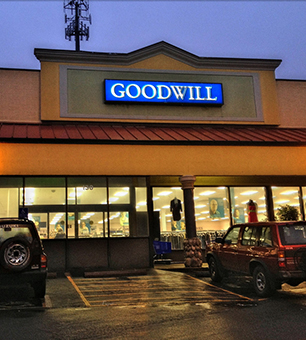Leaders of national advocacy groups for the disabled delivered a petition to Goodwill Industries on Thursday demanding that the company stop using a 75-year-old section of federal labor law to pay disabled employees less than the minimum wage.
About 170,000 people signed the Change.org petition. Representatives from the Autistic Self Advocacy Network (ASAN) and the National Federation of the Blind (NFB) delivered copies of the petition to Goodwill’s headquarters in Maryland and to stores across the country as pickets were held outside.
Goodwill Industries, a massive nonprofit that provides job opportunities at thrift stores nationwide, has been facing down a public relations debacle since investigations by NBC News and Watchdog.org revealed that disabled employees at some Goodwill stores had earned as little as 22 cents an hour in recent years. A subsequent investigation found that employees at a few Goodwill franchises were paid less than 10 cents an hour in 2011.
In a statement, Goodwill said the petition “painted an inaccurate picture” by taking “isolated incidences of a few workers” and implying that they are typical of the company. Goodwill would not comment the “specific circumstances” of any employee because of privacy issues.
Under a Section 14 of the Fair Labor Standards Act, originally passed in 1938, employers such as Goodwill can obtain Special Minimum Wage Certificates to pay disabled workers a wage that is less than the federal minimum if their disability directly impairs them from performing on the job.
“Goodwill should step out of the 1930s and adopt a business model that provides real training and opportunities for workers with disabilities to earn the federal minimum wage or higher,” said Anil Lewis, policy and advocacy director of the NFB.
The NFB, ASAN and the National Council on Disability, a federal advisory committee, have called for Section 14 to be phased out. About 300,000 disabled workers are paid less than the minimum wage under Section 14 of the Fair Labor Standards Act, according to the NFB.
Goodwill, however, has steadfastly defended the provision, arguing that many people with severe disabilities would be unable to find a job if employers could not apply for the exemptions.
The NFB says many employers are profiting off the labor of disabled workers and often receive lucrative federal contracts, so there is no reason to pay anyone less than the minimum wage, regardless of their abilities.
In an editorial in the Huffington Post this year, Goodwill CEO Jim Gibbons claimed Goodwill was “unfairly singled out” by activists and the media for paying disabled workers less than the minimum wage.
“While it is quite easy to look at this provision quickly and ask why people with disabilities should be paid less than other workers, the truth is the certificate allows Goodwill and many other employers to provide opportunities for people with severe disabilities who otherwise might not be a part of the workforce,” Gibbons wrote.
But advocates for the disabled point out that Gibbons brought home $729,000 in salary and deferred payment in 2011, and the CEO of Goodwill Southern California made $1.1 million that same year, according to reports. Salaries for CEOs at 150 Goodwill franchises across the country total $30 million.
“Twenty-three years after the passage of the Americans with Disabilities Act, Goodwill’s actions should be universally recognized as disgraceful,” said Ari Ne’eman, president of ASAN and member of the National Council on Disability. “If you can afford to pay six- and seven-figure salaries to your executives, you can afford to pay minimum wage to your employees.”
Goodwill claims that 5,000 to 7,000 of its 113,000 employees are paid under Special Minimum Wage Certificates, and the average hourly pay of those employees is approximately $7.45 an hour, which is slightly above the federal minimum of $7.25.
Legislation introduced this year by Rep. Gregg Harper, a Republican from Mississippi, would repeal Section 14 of the Fair Labor Standards Act, and groups such as the NFB are working to rally support for the bill in Congress.
Press freedom is under attack
As Trump cracks down on political speech, independent media is increasingly necessary.
Truthout produces reporting you won’t see in the mainstream: journalism from the frontlines of global conflict, interviews with grassroots movement leaders, high-quality legal analysis and more.
Our work is possible thanks to reader support. Help Truthout catalyze change and social justice — make a tax-deductible monthly or one-time donation today.
